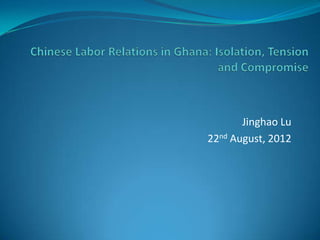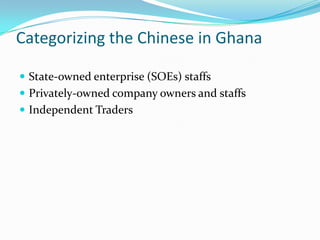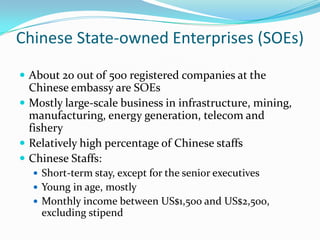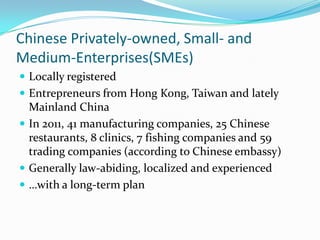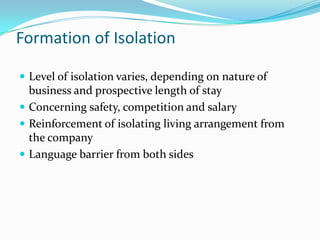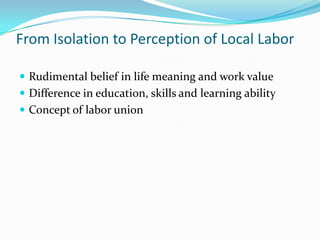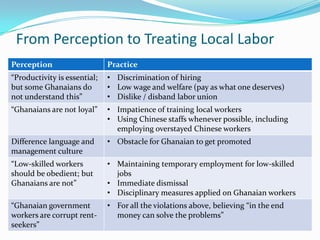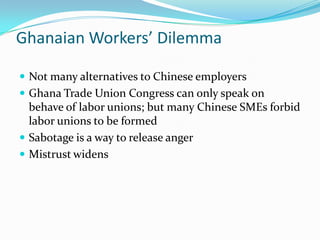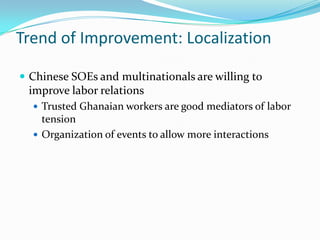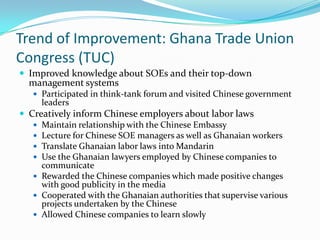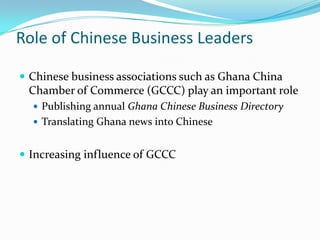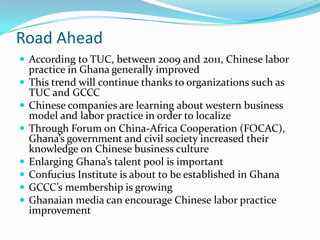Chinese labor relations in Ghana
- 1. Jinghao Lu 22nd August, 2012
- 2. Categorizing the Chinese in Ghana ? State-owned enterprise (SOEs) staffs ? Privately-owned company owners and staffs ? Independent Traders
- 3. Chinese State-owned Enterprises (SOEs) ? About 20 out of 500 registered companies at the Chinese embassy are SOEs ? Mostly large-scale business in infrastructure, mining, manufacturing, energy generation, telecom and fishery ? Relatively high percentage of Chinese staffs ? Chinese Staffs: ? Short-term stay, except for the senior executives ? Young in age, mostly ? Monthly income between US$1,500 and US$2,500, excluding stipend
- 4. Chinese Privately-owned, Small- and Medium-Enterprises(SMEs) ? Locally registered ? Entrepreneurs from Hong Kong, Taiwan and lately Mainland China ? In 2011, 41 manufacturing companies, 25 Chinese restaurants, 8 clinics, 7 fishing companies and 59 trading companies (according to Chinese embassy) ? Generally law-abiding, localized and experienced ? ˇwith a long-term plan
- 5. Independent Traders ? Not included in the discussion
- 6. Formation of Isolation ? Level of isolation varies, depending on nature of business and prospective length of stay ? Concerning safety, competition and salary ? Reinforcement of isolating living arrangement from the company ? Language barrier from both sides
- 7. From Isolation to Perception of Local Labor ? Rudimental belief in life meaning and work value ? Difference in education, skills and learning ability ? Concept of labor union
- 8. From Perception to Treating Local Labor Perception Practice ˇ°Productivity is essential; ? Discrimination of hiring but some Ghanaians do ? Low wage and welfare (pay as what one deserves) not understand thisˇ± ? Dislike / disband labor union ˇ°Ghanaians are not loyalˇ± ? Impatience of training local workers ? Using Chinese staffs whenever possible, including employing overstayed Chinese workers Difference language and ? Obstacle for Ghanaian to get promoted management culture ˇ°Low-skilled workers ? Maintaining temporary employment for low-skilled should be obedient; but jobs Ghanaians are notˇ± ? Immediate dismissal ? Disciplinary measures applied on Ghanaian workers ˇ°Ghanaian government ? For all the violations above, believing ˇ°in the end workers are corrupt rent- money can solve the problemsˇ± seekersˇ±
- 9. Ghanaian WorkersˇŻ Dilemma ? Not many alternatives to Chinese employers ? Ghana Trade Union Congress can only speak on behave of labor unions; but many Chinese SMEs forbid labor unions to be formed ? Sabotage is a way to release anger ? Mistrust widens
- 10. Trend of Improvement: Localization ? Chinese SOEs and multinationals are willing to improve labor relations ? Trusted Ghanaian workers are good mediators of labor tension ? Organization of events to allow more interactions
- 11. Trend of Improvement: Ghana Trade Union Congress (TUC) ? Improved knowledge about SOEs and their top-down management systems ? Participated in think-tank forum and visited Chinese government leaders ? Creatively inform Chinese employers about labor laws ? Maintain relationship with the Chinese Embassy ? Lecture for Chinese SOE managers as well as Ghanaian workers ? Translate Ghanaian labor laws into Mandarin ? Use the Ghanaian lawyers employed by Chinese companies to communicate ? Rewarded the Chinese companies which made positive changes with good publicity in the media ? Cooperated with the Ghanaian authorities that supervise various projects undertaken by the Chinese ? Allowed Chinese companies to learn slowly
- 12. Role of Chinese Business Leaders ? Chinese business associations such as Ghana China Chamber of Commerce (GCCC) play an important role ? Publishing annual Ghana Chinese Business Directory ? Translating Ghana news into Chinese ? Increasing influence of GCCC
- 13. Road Ahead ? According to TUC, between 2009 and 2011, Chinese labor practice in Ghana generally improved ? This trend will continue thanks to organizations such as TUC and GCCC ? Chinese companies are learning about western business model and labor practice in order to localize ? Through Forum on China-Africa Cooperation (FOCAC), GhanaˇŻs government and civil society increased their knowledge on Chinese business culture ? Enlarging GhanaˇŻs talent pool is important ? Confucius Institute is about to be established in Ghana ? GCCCˇŻs membership is growing ? Ghanaian media can encourage Chinese labor practice improvement
- 14. Question and Comments? Please contact Jinghao Lu (jinghao.lu@gmail.com) to obtain the manuscript

